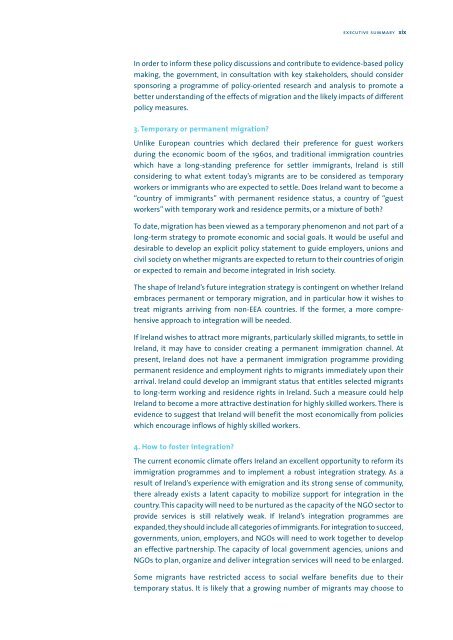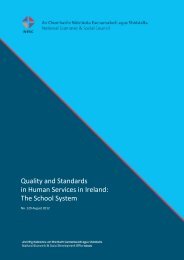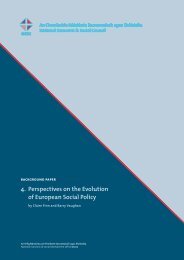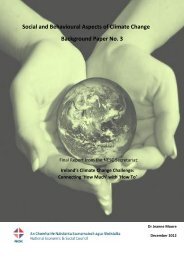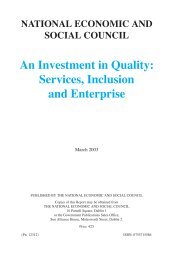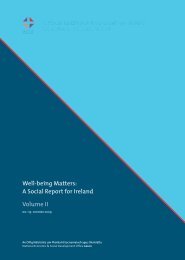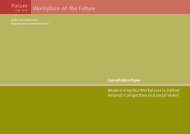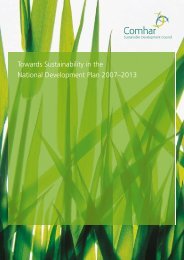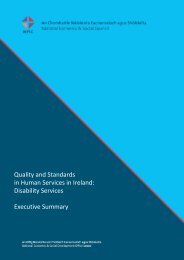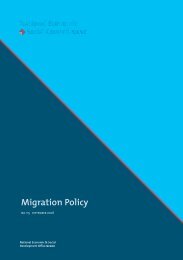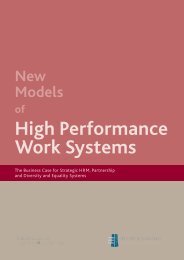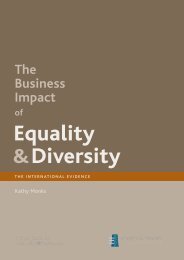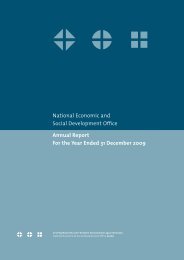Managing Migration in Ireland - European Commission - Europa
Managing Migration in Ireland - European Commission - Europa
Managing Migration in Ireland - European Commission - Europa
Create successful ePaper yourself
Turn your PDF publications into a flip-book with our unique Google optimized e-Paper software.
executive summary xixIn order to <strong>in</strong>form these policy discussions and contribute to evidence-based policymak<strong>in</strong>g, the government, <strong>in</strong> consultation with key stakeholders, should considersponsor<strong>in</strong>g a programme of policy-oriented research and analysis to promote abetter understand<strong>in</strong>g of the effects of migration and the likely impacts of differentpolicy measures.3. Temporary or permanent migration?Unlike <strong>European</strong> countries which declared their preference for guest workersdur<strong>in</strong>g the economic boom of the 1960s, and traditional immigration countrieswhich have a long-stand<strong>in</strong>g preference for settler immigrants, <strong>Ireland</strong> is stillconsider<strong>in</strong>g to what extent today’s migrants are to be considered as temporaryworkers or immigrants who are expected to settle. Does <strong>Ireland</strong> want to become a“country of immigrants” with permanent residence status, a country of “guestworkers” with temporary work and residence permits, or a mixture of both?To date, migration has been viewed as a temporary phenomenon and not part of along-term strategy to promote economic and social goals. It would be useful anddesirable to develop an explicit policy statement to guide employers, unions andcivil society on whether migrants are expected to return to their countries of orig<strong>in</strong>or expected to rema<strong>in</strong> and become <strong>in</strong>tegrated <strong>in</strong> Irish society.The shape of <strong>Ireland</strong>’s future <strong>in</strong>tegration strategy is cont<strong>in</strong>gent on whether <strong>Ireland</strong>embraces permanent or temporary migration, and <strong>in</strong> particular how it wishes totreat migrants arriv<strong>in</strong>g from non-EEA countries. If the former, a more comprehensiveapproach to <strong>in</strong>tegration will be needed.If <strong>Ireland</strong> wishes to attract more migrants, particularly skilled migrants, to settle <strong>in</strong><strong>Ireland</strong>, it may have to consider creat<strong>in</strong>g a permanent immigration channel. Atpresent, <strong>Ireland</strong> does not have a permanent immigration programme provid<strong>in</strong>gpermanent residence and employment rights to migrants immediately upon theirarrival. <strong>Ireland</strong> could develop an immigrant status that entitles selected migrantsto long-term work<strong>in</strong>g and residence rights <strong>in</strong> <strong>Ireland</strong>. Such a measure could help<strong>Ireland</strong> to become a more attractive dest<strong>in</strong>ation for highly skilled workers. There isevidence to suggest that <strong>Ireland</strong> will benefit the most economically from policieswhich encourage <strong>in</strong>flows of highly skilled workers.4. How to foster <strong>in</strong>tegration?The current economic climate offers <strong>Ireland</strong> an excellent opportunity to reform itsimmigration programmes and to implement a robust <strong>in</strong>tegration strategy. As aresult of <strong>Ireland</strong>’s experience with emigration and its strong sense of community,there already exists a latent capacity to mobilize support for <strong>in</strong>tegration <strong>in</strong> thecountry. This capacity will need to be nurtured as the capacity of the NGO sector toprovide services is still relatively weak. If <strong>Ireland</strong>’s <strong>in</strong>tegration programmes areexpanded, they should <strong>in</strong>clude all categories of immigrants. For <strong>in</strong>tegration to succeed,governments, union, employers, and NGOs will need to work together to developan effective partnership. The capacity of local government agencies, unions andNGOs to plan, organize and deliver <strong>in</strong>tegration services will need to be enlarged.Some migrants have restricted access to social welfare benefits due to theirtemporary status. It is likely that a grow<strong>in</strong>g number of migrants may choose to


